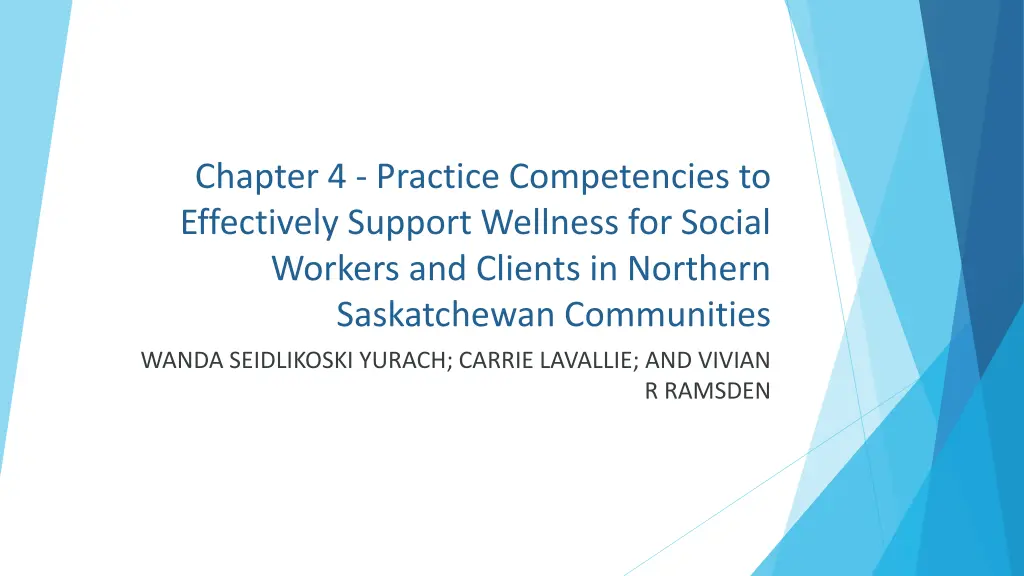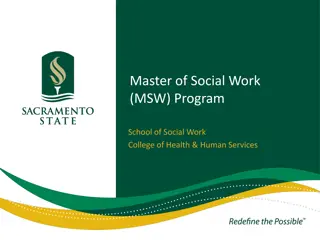
Supporting Wellness in Northern Communities
Explore the challenges faced by social workers in Northern Saskatchewan and learn about practice competencies to protect the well-being of clients and workers. Discover the complexities of working in northern communities, barriers social workers face, and strategies to strengthen their well-being. Gain insights into ethical dilemmas, cultural competency, and trauma-informed practice at different levels.
Download Presentation

Please find below an Image/Link to download the presentation.
The content on the website is provided AS IS for your information and personal use only. It may not be sold, licensed, or shared on other websites without obtaining consent from the author. If you encounter any issues during the download, it is possible that the publisher has removed the file from their server.
You are allowed to download the files provided on this website for personal or commercial use, subject to the condition that they are used lawfully. All files are the property of their respective owners.
The content on the website is provided AS IS for your information and personal use only. It may not be sold, licensed, or shared on other websites without obtaining consent from the author.
E N D
Presentation Transcript
Chapter 4 - Practice Competencies to Effectively Support Wellness for Social Workers and Clients in Northern Saskatchewan Communities WANDA SEIDLIKOSKI YURACH; CARRIE LAVALLIE; AND VIVIAN R RAMSDEN
Introduction This chapter will discuss: A review of the complexities of working in northern communities. Social work practice barriers/challenges for social workers in northern practice. Practice competencies that support/protect the well-being of northern clients and social workers. An overview of micro, mezzo, macro skills.
Learning Objectives By the end of this chapter, you will: Be aware of the complexity of Canadian northern and rural social work practice to create a safe work environment and mitigate ethical dilemmas. Learn how to employ a relational participatory practice approach through critical reflection and enhanced well-being to help others. Learn how to apply ethical and sustainable social work practice competencies at the micro, mezzo, and macro levels when working with communities in northern Canada.
Practice Area and/or the Population of Focus New social workers in northern communities have often reported experiencing culture shock and difficulty fitting in (Cruikshank, 1990; Zapf, 1993). Indigenous clients reported feeling guarded about non- Indigenous social workers/counsellors/therapists in their communities (Morrissette & Naden, 1998). Social workers who want to work in northern Indigenous communities must understand how intergenerational trauma has developed because of colonization and how important it is receive cultural competency training (Truth and Reconciliation Commission of Canada [TRC], 2015).
Overview of Policy and Service Delivery Issues Isolation and Secondary Trauma The demanding nature of remote northern trauma work is exacerbated by the isolation and may increase providers vulnerability to secondary trauma (O Neill, 2010). Social workers also identified that isolation and secondary trauma negatively affected their cognitive and psychological well-being. Northern practice creates unique challenges that require social workers to be aware of strategies and competencies to strengthen/support their own well-being, their families , and their clients .
Overview of Policy and Service Delivery Issues Supporting and Protecting the Well-being of Northern Providers Northern social workers described having encountered the following barriers: high complex-trauma caseloads, limited self- care resources, insecure program funding, and high rates of staff turnover (O Neill et al., 2013). To protect the well-being of social workers in isolated northern communities, workers must effectively use local community services and supports; they must be open to adopting cultural and trauma-informed practice competencies (O Neill et al., 2016).
3 Levels of Social Work Practice Micro Focuses on interpersonal and relational skills of social workers. Social workers must engage in self-reflection to appropriately deal with their own stress and manage power and privilege to effectively maintain relationships with clients and colleagues (Austin et al., 2016, p. 273). Taking a more strength-based and collaborative approach to practice also creates an opportunity for the community to work together to utilize their own ways of doing and healing (Barter, 2009).
3 Levels of Social Work Practice Mezzo Social workers must focus on their ability to build broader relationships with agencies in communities that may have competing goals. Social workers should take time to visit each northern community agency they work with, introduce themselves, explain their role, and spend time getting to know the individuals that work in the different agencies. Networking is instrumental to building multidisciplinary interagency teams to carry out effective client services. Building teams and relationships is also crucial for the well- being of northern and remote social workers.
3 Levels of Social Work Practice Macro Social workers must be aware of overarching influences of the structural, political, financial, and ideological powers that social workers want and hope to change and adjust to meet the needs of all individuals. Social workers working in northern Saskatchewan have reported feeling powerless to effect change at broader levels such as structural inequalities and systemic racism (Seidlikoski Yurach, 2021, p. 131). Northern social workers acknowledge the importance of systemic changes; however, they often struggle to find the time and energy to focus on these issues.
Conclusion Social workers seeking to provide effective services and supports must incorporate a relational participatory approach by reflecting on their own trauma history, leading with humility, and supporting clients in telling their story in their own language (Winter, 2019). Evidence-informed practice competencies are needed to develop ethical, safe, and supportive workplaces for sustainable social work, including trauma work, in northern Canadian communities. Implementing a community of practice can help new and seasoned northern social workers in easing the effects of isolation and secondary trauma (Seidlikoski Yurach, 2021).
Additional Resources Makokis, P., & Greenwood, M. (2017). What s new is really old: Trauma informed practices through understanding historic trauma. https://www.nccih.ca/634/What_s_New_is_Really_Old__Trauma_Inf ormed_Practices_through_Understanding_of_Historic_Trauma.nccih? id=1008 Rzeszutek, M., Partyka, M., & Go b, A. (2015). Temperament traits, social support, and secondary traumatic stress disorder symptoms in a sample of trauma therapists. Psychotherapy Research Practice & Practice, 46(4), 213-20.
References Austin, M., Anthony, El, Tolleson Knee, R., & Mathias, J. (2016). Revisiting the relationship between micro and macro social work practice. Families in Society: The Journal of Contemporary Social Services, 97(4), 170-277. Barter, K. (2009). Reclaiming community: Rethinking practices for the social work generalist in northern communities. In R. Delaney & K. Brownlee (Eds.), Northern and rural social work practice a Canadian perspective. Thunder Bay, ON: Lakehead University (pp. 209- 221). Cruikshank, J. (1990). The outsider: An uneasy role in community development. Canadian Social Work Review / Revue Canadienne De Service Social, 7(2), 245- 259. Goodman, P. (2012). Rural Health Training Institute. In J. Kulig & A. Williams (Eds). Health in rural Canada (pp. 101-117). UBC Press. Morrissette, P., & Naden, M. (1998). An interactional view of traumatic stress among First Nations counselors. Journal of Family Psychotherapy. 9(3), 43-60.
References O Neill, L. (2010). Northern helping practitioners and the phenomenon of secondary trauma. Canadian Journal of Counselling, 44(1), 130-149. O Neill, L., George, S., & Sebok, S. (2013). Survey of northern informal and formal mental health practitioners. International Journal of Circumpolar Health, 72(1). O Neill, L., Koehn, C., George, S., & Shepard, B. (2016). Mental health provision in northern Canada: practitioners views on negotiations and opportunities in remote practice. International Journal for the Advancement of Counselling, 38(2), 123-143. Saskatchewan Association of Social Workers (2020). Standards of Practice for Registered Social Workers in Saskatchewan. Seidlikoski Yurach, W. (2021). The power of stories: The experiences and well- being of mental health providers working in northern Saskatchewan communities. (ORCID No. 000-0001-8645-5458). [Doctoral dissertation, University of Saskatchewan]. Harvest.
References Substance Abuse and Mental Health Services Administration (2011). Trauma informed approach and trauma specific interventions. Truth and Reconciliation Commission of Canada. (2015). Truth and Reconciliation Commission of Canada: Calls to Action. Winter, K. (2019). Relational social work. In M. Payne, & E. Reith Hall (Eds.), Routledge handbook of social work theory (pp. 1-10). Routledge. Zapf, M. (1993). Remote practice and culture shock: Social workers moving to isolated northern regions. Social Work, 38(6), 694-704.






















